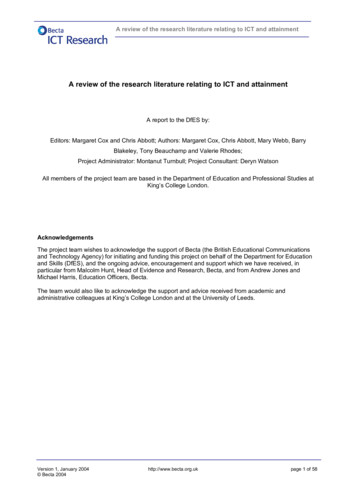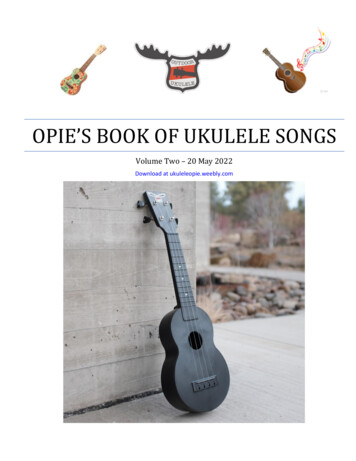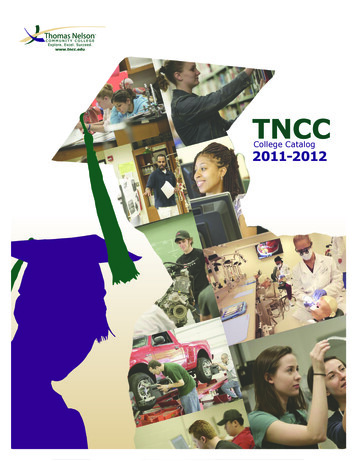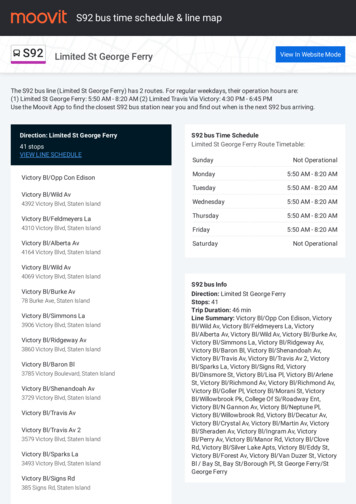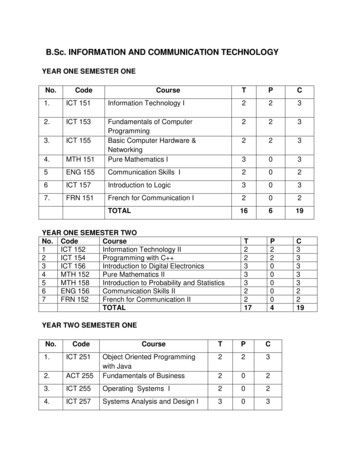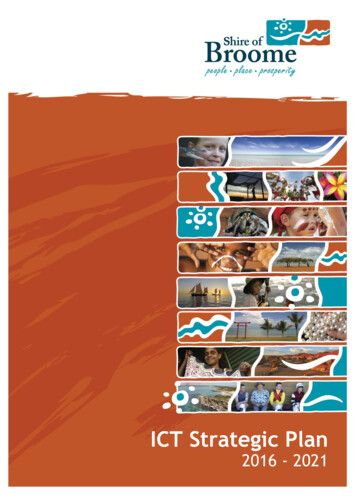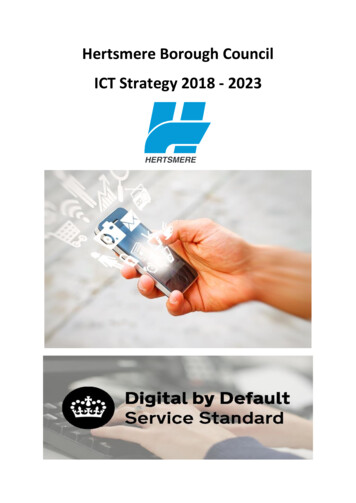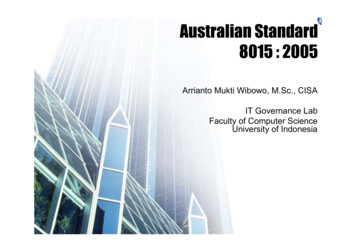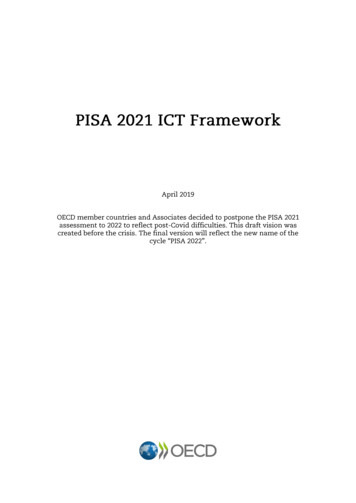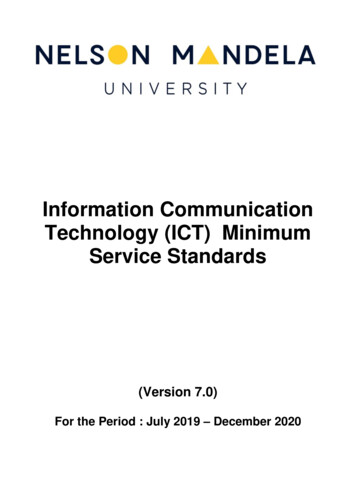
Transcription
Information CommunicationTechnology (ICT) MinimumService Standards(Version 7.0)For the Period : July 2019 – December 2020
Nelson Mandela University ICT Minimum Service StandardsCONTENTS1.INTRODUCTION . 32.SERVICE CATEGORIES . 33.SERVICE CATALOGUE - SERVICE LINES AND SERVICE STANDARDS . 44.SEVERITY LEVELS . 85.METRICS DRIVING THE COST OF ICT SERVICE PROVISION (ALLOCATIONMETRICS) . 86.DEFINITIONS . 107.SERVICE LINES AND SERVICE STANDARDS – DETAILS . 117.1End User Services . 117.2Application / Development / administration Support . 137.3Data Centre Services . 147.4Communication Services . 157.5Project Management . 167.6ICT Relationship and Service Level Management Services . 167.7INFORMATION SECURITY SERVICES . 178.ESCALATION PROCEDURE . 189.USER OBLIGATIONS . 21Version: v 7.0Date: July 2019Page 2 of 21
Nelson Mandela University ICT Minimum Service Standards1. INTRODUCTIONThis service offering document highlights the core service and Minimum Service Standards provided by ICTServices and encapsulates the minimum service standards that the department can commit to in proportion tothe current staff and infrastructure resources available.ICT Services follows best practice as outlined by the IT Infrastructure Library (ITIL) framework in order toimplement Service Level Management. This framework is the most widely used and accepted approach to ITService Management by many companies worldwide.The content of this document will be reviewed every 18 months by the Deputy Director: ICT Service Deliveryand amendments will be made accordingly. Discussion workshops are arranged during the review period withICT Services staff. The revised document will be sent to the ICT Committee for input and approval.2. SERVICE CATEGORIESThe service offering seeks to clearly document the services ICT Services provides and the quality level atwhich those services are to be delivered.The services are categorised into eight different areas:End User Support Services – Provide Nelson Mandela University users of ICT services a single point ofcontact (Service Desk) for their ICT requirements and provide effective support in their use of ICT services.Learning Management System Support and Maintenance – The use of technology should be a normal partof mainstream teaching and learning provision, processes and practices; Blended Learning’s purpose isto promote all facets of teaching and learning with technology.Information Systems Development – Development, support, maintenance, recommendations andenhancement of line of business, teaching and learning, and web applications at the Nelson MandelaUniversity.Data Centre Services – The management of campus wide data centres where Nelson Mandela Universitybusiness applications run in a secure, controlled environment.Communication Services – Management of voice, video and data communications (includes mobile phones,conferencing and wide and local-area networking).Project Management – Assists the Nelson Mandela University to deliver important business-focusedtechnology initiatives on time and within budget (includes Identification, Definition, Management andImplementation aspects). Major ICT projects are administered through ICT Services.ICT Strategic Relationship and Service Level Management Services – Ensures that ICT services aredelivered in accordance with the service levels agreed with the user community.Align ICT’s strategies with those of the Nelson Mandela University, so as to ensure maximum businessvalue. Ensures that the overall performance of the ICT function in terms of cost and quality.Information Security Services – The implementation and management of various physical, technical andoperational security controls to ensure the confidentiality, integrity and availability of Nelson MandelaUniversity information and systems. Security controls are considered by ensuring an balance is maintainedbetween security, usability and cost as well as the risk level it addresses.Version: v 7.0Date: July 2019Page 3 of 21
Nelson Mandela University ICT Minimum Service Standards3. SERVICE CATALOGUE - SERVICE LINES AND SERVICE STANDARDSService LineService OfferingICT Service Desk-Single Point of Contact (SPOC) for all ICTrelated services and issuesIncident/Request logging to call closure1st and 2nd line supportWalk in student & staff supportAllocation Metrics-No of service desk callsNo of first call resolutionsNo of calls breachedNo of unacknowledged callsFeedback of Satisfaction survey-No of student requestsNo of student devicesNo of images printedNo of payments per categoryreceivedNo of Lab devices imageVolume of bandwidth consumed-No of PCs, laptops, printersand peripheralsNo of computer labsNo of staffNo of studentsNo of service desk callsNo of service desk resolutionsNo of allocated calls resolvedin timeNo of printoutsNo of Scanned pagesNo of copied pagesICT Student Support- Application Support- Imaging management- Internet monitoring and management- Print and File Services- Student Counter Facilities- Network connectivity- 24hour computer labs- Student IT Support Centres (SITS)End user technical support-End User SupportServicesPC Hardware, software, network andperipheral installation, replacement,- maintenance, management and support- (Staff / General Computer Labs)- 3rd Party Hardware Repairs- Imaging and Reprographics management- Remote Site support- Voicemail support- Meal Management System support- Nelson Mandela University contract staff loan PCmanagement- Mobile supportStandardised Software Supported and Provided(license dependent)- Operating Systems (Microsoft Windows & AppleMAC)- Office 365- Adobe Acrobat- ITS- Infoslips- ATLAS.ti- EndNote- FileDirector- MS Project- MS Visio- Respondus- TurnitInSoftware License Procurement and ManagementEnd user facility management- ICT Facilities Management- Computer Lab Facility Planning- Computer Replacements, Relocations and newAllocations.- No of PCs- No of Std Applications- No of licenses-No of new installations,relocationsNo of 5 yr old PCs, laptopsLab utilisation stats5yr replacement budgetImaging and Reprographics ServicesImaging-Imaging centralised services and supportStaff Imaging reportsImaging charging servicePrint Services- No of MFD’s, printers,- scanners, copiers- Available online imaging ReportsReprographics Services- No of Reprographics requestsVersion: v 7.0Date: July 2019Page 4 of 21
Nelson Mandela University ICT Minimum Service StandardsService LineService Offering- High volume digital photocopying- Colour photocopying- Offline finishing- Typesetting and Artwork DesignPublic area display- System configuration support- Content creationUser supportTechnology CentreCopy Shop- High volume digital photocopying- Colour photocopying- Offline finishing (Binding, laminating, punching,stapling)- Large format colour printing (Plotter)- Private printing (internal and external- Outsourced printing (internal requests)SITS CentreSales – Laptops, Computer consumables (Flash drives,memory cards, wireless mouse, universalchargers ect.)Allocation Metrics- No of systems & displays- No of pages- No of service desk calls- No of print jobs- No of copies- No of Sales- No of SalesServices- Troubleshooting faulty devices- VPN, Wireless Connection/ Email Setup- Virus Check, Anti-virus installation, Anti-virus Update- Software Installation- System Restore – windowsIT Inventory Management-Hardware (Servers, PCs, laptops, printers)Network (Switches, routers, wireless accesspoints)SoftwareConfiguration Management Information- No of assets per category- No of replacements plannedEmail and messaging- Student mail maintenance and Staff Mail accountcreation and maintenance- Bulk SMS support for Staff- Staff and Student Unified Communications (UC)User Authentication and Access- Student and Staff Network account administration- ITS System user Account AdministrationNo of email accountsNo of enabled staff accountsEmail bandwidth consumptionNo of UC enabled users-No of email accountsNo of user accountsNo of ITS user accountsNo of new requests for accessNo of change requests to Access- No of ad-hoc service requestAd-Hoc Service RequestsLearningManagementSystem Supportand Maintenance-Learning Management System Support andMaintenance- Learning Management System (LMS) support(Moodle & Blended Learning)- Module creation and maintenance- Testing and installation of plug ins- Patch maintenanceSystem upgradesBusiness and Systems Analysis- Business Process Management- Business Process Improvement-No of usersNo of loginsNo of LMS sites/coursesNo of activitiesNo of instances- No of user accounts in the relevantapplication- No of stakeholdersVersion: v 7.0Date: July 2019Page 5 of 21
Nelson Mandela University ICT Minimum Service StandardsService LineService OfferingAllocation Metrics- No of processes analysed per year- No of users in Business AreasApplication support, maintenance & administration- System Configuration- System User Support- System User Training- System Patch Maintenance- System Program Transfers- Program Fixes- Database support- System upgrades- Other ApplicationsApplication Enhancements & New DevelopmentsInformationSystemsDevelopment-System EnhancementsSystem Development and SupportDevelopment of 3rd Party ApplicationsWeb Services Development and EnhancementsDatabase Administration and Support- No of ITS user accounts in therelevant application- No of service desk calls- No of change requests- No of systems- No of patches- Based on the volume, duration andcomplexity of the requests- No of software programs- No of projects- No of service desk callsWeb Services support and maintenance-University Public WebsitesInternal departmental websitesStaff and Student PortalsOther Application Development3rd Party Application supportWeb based education support systemsWeb Content Management ServicesDatabase Administration and SupportWeb server system administrationMobile web servicesSystem Patch MaintenanceSystem upgrades-Voice and TelephonyVoice (Usage & Support)Voice (Moves, Adds, Changes)Telephony user trainingVoice Hardware MaintenanceTelephony System accounting and administrationRightFax, IVR, Bulk SMS, VOIP support,Contact Centre SystemTelephone installation and support-No of usersNo of websitesNo of visitors to websitesNo of change requestsNo of web parts developmentNo of page views- No of voice devices- Call minutes used- Cost of telephony serviceWAN data servicesCommunicationsServices- Remote Site Connectivity- Internet Connectivity- VPN facilitiesLAN data services- Wireless services- Network infrastructure management- Wired services-No of usersNo of client devicesNo of network pointsNo of network devicesDistance between sitesWAN bandwidthBackbone bandwidthInternet bandwidthHardware Maintenance- 3rd party contract management- Incl. Switches, routers, wireless AP’s, firewallsNetwork Systems Management- Monitoring WAN/LAN links, network hardware,- core services- Disaster Recovery Plan/ServicesVersion: v 7.0Date: July 2019Page 6 of 21
Nelson Mandela University ICT Minimum Service StandardsService LineService OfferingAllocation Metrics- Change Management- Incident ManagementData Centre InfrastructureEnterprise Systems ManagementDataCentreServices- Server support- Storage & Backup System support- Systems Administration and Architecture- Licensing Server Support- Patch Management- File Services- Server Monitoring and Reporting- Server Operating System support- Data Centre Hardware Maintenance- Disaster Recovery Plan/Services- Change Management- Incident Management- Application Hosting and Support- Database Administration & Support- Enterprise Content Management (document- management, imaging, records management,- workflow)- Video streaming (live and on demand)- ERP System AdministrationProject DefinitionNo of usersNo of systemsNo of serversAvailabilityStorage and Compute Capacity- Project’s actual cost and time- No and size of projects- No of completed projectsProject ImplementationProjects-Project ManagementProject DeliveryService Level Management- Contract and SLA management- 3rd Party Management (Underpinning contracts)Compliance ManagementInfrastructure Planning-No of usersNo of ICT staffOPEX and CAPEX budgetresourcesNo of service contractsNo of reports-No of virusNo of patches rolled outNo of email threats blockedNo of external threats blockedNo of recoveries completedNo of awareness emails andcourses presentedICT Facilities ManagementICT Leadership, Governance and StakeholderEngagementICT StrategicRelationship andService LevelManagementServicesStrategic Planning and Performance ManagementQuality & Risk ManagementProgram ManagementReport ManagementICT Financial Management, Budgeting and PlanningMaintenance Contract ManagementCapacity and Availability Management and PlanningResource levelling between projectsService Continuity ManagementBusiness & Technology AdviceBusiness Process ManagementBusiness Process ImprovementInformationSecurity ServicesAnti-Virus Management and AdministrationPatches and Updates ManagementEmail Protection against Phishing, Spam andMalwareFirewall Protection against External ThreatsBackups and Recovery of Core SystemsInformation Security Awareness for staff andstudentsVersion: v 7.0Date: July 2019Page 7 of 21
Nelson Mandela University ICT Minimum Service StandardsService LineService OfferingAllocation MetricsUpdated ICT Policies, Procedures and GuidelinesDisaster Recovery Plans on Core SystemsCCTV Surveillance of High Risk AreasAccess Controlled to High Risk Areas- ICT policies, procedures andguidelines versions- DRP versions and testing schedules- No of cameras installed- No of access control installed4. SEVERITY LEVELSIn order to provide a cost effective ICT service it is necessary to prioritise the demands that are made on theNelson Mandela University ICT Services department according to the impact on the Nelson MandelaUniversity. The following table provides a mapping between the level of impact an incident has on the NelsonMandela University and the severity with which it will be attended to by the ICT Services Department.Severity Level1(High)Escalates on 4 workinghoursImpactThe entire Nelson Mandela University is affected.A core process/service (e.g. registration) is not operating.Learning is severely disrupted.A service for an entire campus or building/department is down.2Escalates on 8 workinghoursA user is not able to do their main job function and no work-around is available3Escalates on 24working hours4Escalates on 5 workingdaysA user is not able to do a component of their job and no work-around is availableA user is not able to do a component of their job but the problem is minor or a workaroundexists5Escalates on 10working days6(Low)Escalates on 20working daysService RequestPre-arranged Service Request5. METRICS DRIVING THE COST OF ICT SERVICE PROVISION (ALLOCATIONMETRICS)Changes in the following high-level factors will have an influence on the cost of provision of ICT services. Forsome factors (e.g. PCs and Laptops, Number of Supported Sites, etc.) there is a direct influence. For otherfactors (e.g. Number of Employees, Number of Students) the impact on costs is more indirect. Changes inthese metrics can be used for justifying budget and headcount increases. It is important to note that newsystems or special developments may require budget from user departments.Version: v 7.0Date: July 2019Page 8 of 21
Nelson Mandela University ICT Minimum Service tity(2017Figures)BaselineQuantity(2018Figures)PCs (Staff)236221632063Laptops (Staff)98313761895PCs (Student)367429473714-5486321390410Basic Users (AD)325863469035312Messaging Users (staff) including general mailboxes442745774768Messaging Users (Student)ITS Active Users (Excluding all staff using theiEnablers)Number of Project Requests (incl on hold, r of Projects Completed1123820Number of supported Websites on ContentManagement System345367380Number of SharePoint Module Sites (active)8415134545057Number of Moodle module sites210854006756MetricLaptops (Students)Printers & Multi-Function Devices (MFD’s)Public area displays576192Amount of displays-920Amount of systems-22Amount of pages-5070Number of ITS software programs / modulesmaintained212521342378Telephones – Fixed450045003622Number of Unified Messaging users18071428335Number of RightFax clients138113251105Number of Bulk SMS clients180180180104091315513655Number of Servers425466422Number of network devices (switches, routers, AP’sand firewalls)120217662014Number of Staff incl Nelson Mandela Universitycontract staff327855636115Number of Students (incl off campus)270873145030666Number of Supported Campuses677Total number of Student Labs149186169North Campus-6249South Campus-7975112nd Avenue Campus-1112Missionvale Campus-2321Number of network pointsAddoVersion: v 7.0Date: July 2019Page 9 of 21
Nelson Mandela University ICT Minimum Service 1345290384North Campus – 7 technicians-250394South Campus – 8 technicians-3984882nd Avenue Campus – 2 technicians-339393Missionvale Campus – 2 technicians-244405George Campus – 2 technicians-219240Percentage of First Call Resolution at Service Desk foryear54%58%51%Average Number of Service Deskrequests/Calls per Month255237653220Percentage of Telephone calls abandoned at ServiceDesk for Year24%29%26%Number of Reprographics requests659195855346Average Daily Internet Traffic in GB2276.973164.163547.32Average Daily Unique Internet Users93061160712483Number of Microsoft Updates released via updateservices429411382Number of managed Analog CCTV cameras533544544Number of managed IP CCTV cameras633762771Number of Keymaster access control readers989898Number of SALTO access control readers691781794-47124MetricGeorge CampusAverage Number of PC/Laptops per SupportTechnicianNumber of Biometric readers6. DEFINITIONSAdministrative YearThe Administrative Year is defined as the period of time that the Nelson Mandela University is fully operational.It will include academic holidays, but will exclude all weekends, public and Nelson Mandela University holidaysas well as the Nelson Mandela University’s defined “shutdown Dec/Jan” period.AvailabilityTime that the services is agreed to be available minus the scheduled down time expressed as a %. (Excludingacts of God, power outages, declared disasters or any other reason or events beyond the control of ICTServices (e.g. 3rd party underpinning contracts)).Working HoursWorking Hours is defined as the period from 8:00 to 16:30pm unless otherwise specified.AssigneeThe person who is assigned by the Service Desk to resolve a call.DevicesVersion: v 7.0Date: July 2019Page 10 of 21
Nelson Mandela University ICT Minimum Service StandardsCan include PCs, laptops, netbooks, mini-pc’s, tablets, printers, plotters, scanners, cell phones, PDAs,telephones, switches, routers, servers.Best EffortMeans the relevant responsible people will be contacted and if they are reasonably able to attend to the matterthey will.Core Process / ServiceIncludes Registration, ITS, Email, Voice, Internet, Network, LMS, Sharepoint, Public website7. SERVICE LINES AND SERVICE STANDARDS – DETAILS7.1END USER SERVICESThe purpose of End User Services is to deliver a Single Point of Contact (SPOC) within the Nelson MandelaUniversity ICT function for all the institution’s authorised users. End User Services encompasses the followingprimary services:ICT Service Desk (SPOC) and Student Support: A single point of contact for all day-to-day IT service requests and incidents.First and Second line support is also provided by the Service Desk.End User Technical Support Services: Install, repair and maintenance for desktops, Laptops, Mini-pc’s and File & Print Services. Fortablets and cell phones basic setup are covered here.End User Facility Management Services: Full life-cycle management of end-user devices. This includes evaluation, purchasing, assettracking, implementation of technology refreshment cycles (5 year CAPEX PC/Laptop replacementplan) and imaging services across the Nelson Mandela University.Directory Services (authentication and authorisation): Administration and support services for directory services.Messaging and Email: Administration and support services for corporate messaging and email platforms.END USER SERVICESICT Service Desk (SPOC) & Student SupportCoverage PeriodService Desk 07:30 to 16:30, Monday to Friday, during the“Administrative” yearStudent Counter 08:00 to 16:30, Monday to Friday, during the “Administrative”yearAvailability duringdisruptions causedby protest or disasterLimited 1st line support for cases logged via telephone, Mailbox and the self helpportal.Avg. Time ToAnswer80 % of telephone calls answered in less than 10 secondsResolved at ServiceDesk40 % of calls resolved at the Service Desk (Minimum)CustomerSatisfaction90 % Satisfactory (based on the Call Closure Survey)End User Technical Support ResolutionVersion: v 7.0Date: July 2019Page 11 of 21
Nelson Mandela University ICT Minimum Service StandardsEND USER SERVICESCoverage Period08:00 to 16:30, Monday to Friday, during the “Administrative” yearSeverity 180% restored within 4 working hoursSeverity 280% restored within 8 working hoursSeverity 380% restored within 3 working daysSeverity 480% restored within 5 working daysSeverity 580% restored within 10 working daysSeverity 680% restored within 20 working daysHardwareMaintenanceRepair or replace faulty items with equivalent / better spec if ICT CAPEXequipment is funded by council funds, incl PC’s, servers, printers, plotters,scanners, laptops.Laptop and wireless mouse maintenance does not cover battery replacements.All maintenance costs relating to discretionary funded items (ie. laptops, pc andtablets) must be covered from the same funding sourcePC, Laptop,InstallationsNew equipment installation complete within 8 working hours from start ofinstallation to completion.Multi-FunctionDevices (MFD’s) andprintersNew equipment installation complete within 16 working hours from start ofinstallation to completion.Computer LaboratoryInstallationsMeal managementsupport(after hours exclstudent holidayperiods )Installation completed by the start of term subject to software/licensing availability.Ad-hoc requests to load additional software (redump PCs) – 10 working days isrequired.After hours standby support from 6.00 - 8.00 and from 16.30 – 19.00 from Mondayto FridayAfter hours standby support from 6.00 - 19.00 from Saturday to SundayEnd User Facility ManagementPC / LaptopReplacementMinimum replacement every 5 years by end of June of that year (Subject tobudget approval and capital budget guidelines)Learning Management System SupportCoverage Period08:00 to 16:30, Monday to Friday, during the “Administrative” yearService OutsideCoverage PeriodPublic and Nelson Mandela University Holidays, Administrative Shutdown andAfter Hours:Only Severity1 on a “Best Effort” basis onlyScheduledMaintenance Periods(as required)Every Wednesday during the Administrative year between 21.00 and 6.00 with atleast 1 working days’ noticeUrgent Data Centre Maintenance - As requiredApproved via Change Management ProcessImaging SupportCoverage Period07:30 to 16:30, Monday to Friday, during the “Administrative” yearReprographics SupportVersion: v 7.0Date: July 2019Page 12 of 21
Nelson Mandela University ICT Minimum Service StandardsEND USER SERVICES07:30 to 16:00, Monday to Friday, during the “Administrative” yearCoverage PeriodCopy Shop and SITS Centre Support08:00 to 16:30, Monday to Friday, during the “Administrative” yearCoverage PeriodDirectory Services (authentication and authorisation)Availability98% (Measured on 24x7x365 clock)New Accounts80% within 2 working days of receiving request (Staff and Registered Students)80% within 3 working days of receiving change request via emailITS Access/ RightsMessaging and EmailAvailabilityAs per Service Providers (Office 365)New Mailboxes80% within 2 working days of receiving request (Staff and Registered Students)Mailbox SizeAs determined by Service Provider per staff/student account (100GB)Mail Delivery Time90% of total messages delivered within 1 working hour (on premise)As per Service Providers7.2APPLICATION / DEVELOPMENT / ADMINISTRATION SUPPORTThe application support service covers the ITS system, teaching, learning, web systems and various otherapplications. The following primary services are included:Business and Systems Analysis Business and Systems Analysis: Analysing, designing and implementing new businessmechanisms with the aid of technology to improve the efficiency and the effectiveness of thebusiness.Business Process Support: Providing advice, guidance and support for the business processes.Application Development, Maintenance and Support Break-Fix: An application is not operating correctly. The problem needs to be identified, analysedand resolved.Regular Maintenance: Covers steps that must be performed on a regular basis in order to ensurethat the application continues to run. These include upgrades, patches, user accounts, monitoring,database management, etc.Development of new systemsEnhancements Design and Implementation of new software to support the Business Processes.Changes to an application to support a new business requirement.INFORMATION SYSTEMS DEVELOPMENTIncident Management / Support and MaintenanceCoveragePeriod08:00 to 16:30, Monday to Friday, during the “Administrative” yearVersion: v 7.0Date: July 2019Page 13 of 21
Nelson Mandela University ICT Minimum Service StandardsINFORMATION SYSTEMS DEVELOPMENTService OutsideCoveragePeriodIncident Management / Support and MaintenancePublic and Nelson Mandela University Holidays, Administrative Shutdown and AfterHours:Only Severity 1 on a “Best Effort” basis onlySeverity 180% restored within 4 working hoursSeverity 280% restored within 8 working hoursSeverity 380% restored within 3 working daysSeverity 480% restored within 5 working daysSeverity 580% restored within 10 working daysSeverity 680% restored within 20 working daysScheduledMaintenanceRegularly; Approved via Change Management ProcessesEnhancements / Development7.3SchedulingApproved via Change Management ProcessesPrioritisationAgreed between Nelson Mandela University business users and ICT ServicesDATA CENTRE SERVICESThe Data Centre Services cover the institutions various computer rooms. The service includes the operationalmanagement of the infrastructure and site facilities. Also included are monitoring tools and support andmaintenance of the data centres. The service covers development, test and live systems.DATA CENTRE SERVICESIncident Management/Support and MaintenanceCoveragePeriodService s required)File Services08:00 to 16:30, Monday to Friday, during the “Administrative” yearPublic and Nelson Mandela University Holidays, Administrative Shutdown and AfterHours:Only Severity 1 on a “Best Effort” basis onlyITS - Every Wednesday during the Administrative year between 19:00 and 06:00 withat least 1 working days’ noticeUrgent Data Centre Maintenance - As requiredApproved via Change Management ProcessStaff Home directory size 2GB (h drive)Student Home directory size 1GB (h drive)Cloud for staff and students (OneDrive) 1TBSeverity 180% restored within 4 working hoursSeverity 280% restored within 8 working hoursSeverity 380% restored within 3 working daysSeverity 480% restored within 5 working daysVersion: v 7.0Date: July 2019Page 14 of 21
Nelson Mandela University ICT Minimum Service StandardsDATA CENTRE SERVICES7.4Severity 580% restored within 10 working daysSeverity 680% restored within 20 working daysDisasterRecoveryLess than 72 hours (24x7x365 clock) for core servicesData on network drives (Students and Staff) recoverable up to a maximum of 3 monthsEmail messages (Staff and Students) recoverable as per service providerNote – Approved DRP’s overrides aboveTotal AnnualAvailability98% within working hours measured over a moving 365 day periodCOMMUNICATION SERVICESThe physical infrastructure necessary to enable effective electronic communication within and beyond theinstitution is supported by the Communication Services. This infrastructure encompasses voice, data andvideo facilities under the control of ICT Services. Service levels or services not under control of ICT Servicessuch as Telkom lines, overseas databases and internet links cannot be guaranteed.The following primary services are included:Voice (Usage and Support) Fixed: IP Telephony, PABX, Voice over IP, Voicemail, Video Conferencing and CollaborationVoice (Moves, Adds, Changes and Training)Telephony AdministrationVoice Hardware MaintenanceRightf
ICT Services follows best practice as outlined by the IT Infrastructure Library (ITIL) framework in order to implement Service Level Management. This framework is the most widely used and accepted approach to IT Service Management by many companies worldwide.
